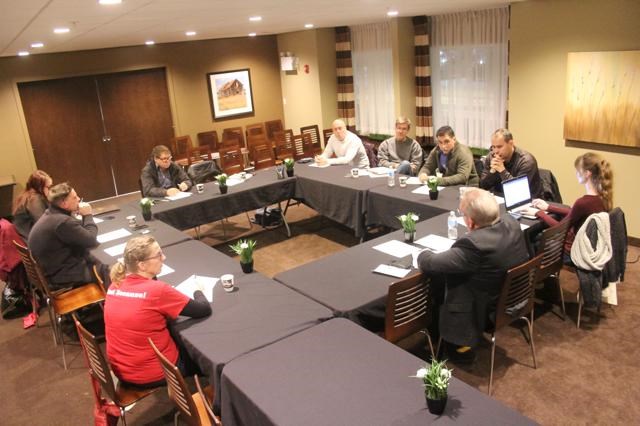By Greg Nikkel
A small group of business people and educators gathered to share ideas about Saskatchewan’s future and how to improve it, at one of a series of consultation meetings held around the province for the #TransformSK sessions.
A meeting was hosted in Weyburn on Wednesday evening at the Microtel Hotel meeting room, and the moderator for the session was Steve McLellan, CEO of the Saskatchewan Chamber of Commerce.
“The range of people coming out is very good,” said McLellan, but commented they haven’t had as many farmers out for the sessions as they were hoping.
The group of stakeholders will gather all of the input on Jan. 19-20, and around mid-February will release the final report to the government and the public, with the suggestions and ideas to improve the province. The TransformSK sessions is a joint project of the Saskatchewan Chamber of Commerce, Saskatchewan Construction Association, Saskatchewan Mining Association, Saskatchewan Manufacturing Council and the Agricultural Producers Association of Saskatchewan (APAS).
At the meeting, three basic questions formed the start of the discussions, including what the top challenges facing the province are, what the top opportunities are, and what the province needs to do differently to make sure the future is a prosperous one.
Among the challenges facing Saskatchewan is the continuing decline of rural communities, and being able to afford the level of health care to Saskatchewan residents, as it currently uses the largest share of the provincial budget.
On the latter challenge, it was pointed out the abuses of the system are costing health care a lot, not to mention inefficiencies in the system, and there needs to be some way to address that.
Education is also part of the key to improving things in the province, and the graduation level of First Nations students “is quite embarrassing” compared to the graduation rate of the general population.
In the area of agriculture, a challenge is to be able to add value to the commodities that produced here in Saskatchewan, which would create more opportunities and keep some of the wealth in the province.
Noting that durum of high quality is grown and produced here, the question was asked, “Pasta is made from the kamut grown in our area. Why does it have to go to Italy to be made into pasta?”
For health and education, the “layers of administration” was voiced as a concern, but it was pointed out that for education at least, 70 per cent of the budget is to pay teachers in the classroom, and 10 per cent is for bus transportation.
“How do we determine the right mix? How much is regionally dictated and how much is culturally dictated?” asked McLellan, noting there seems to be a rural-urban divide on some issues. He pointed out they heard views in Saskatoon that people are frustrated with the property tax breaks given to farmers, as one example.
Addressing an issue that affects both health and education, it was pointed out that for doctors and teachers, it was family and roots in the community that kept some people here, but otherwise, “If I didn’t have roots here, I wouldn’t be living in Weyburn.”
The question was also asked whether a new hospital, which is proposed for Weyburn, will help bring in new doctors to the community and keep them here?
In answer to the comments about some of the abuses in health care, such as of the ER service in hospitals, a suggestion was made for a basic fee, such as $5, with the comment made, “People pay $50 to go to a movie and have popcorn, but they balk about paying $5 to see a doctor.”
To address those who might not be able to afford a fee, the further suggestion was made to have an income test to ensure that those who cannot afford it will still be provided with health care services.
On the issue of rural sustainability, the question was posed what needs to be done to keep rural areas viable. It was noted that small towns and rural areas need to better market themselves and residents need to be more willing to look inwards for the unique services and products available.
An example was the local Italian establishment in Ogema which draws people from around the province, and yet local people would rather run up to Moose Jaw or Regina to go to a restaurant.
It was also noted that tourist dollars for many small cities and towns are from Saskatchewan, not necessarily from out-of-province, and these communities need to capitalize on that more.
On the question of what opportunities could be done better in Saskatchewan, one suggestion was there needs to be more manufacturing and processing here, since many resources and raw products are produced here.
One suggestion was to have linens made here, since the flax is grown here in large quantities.
Education and training was noted as a major key to allow this to happen, as for example high-tech ventures would only work if there are educated people here to fill the needed positions.
In regard to the carbon tax to come, McLellan noted the province has less than 13 months to decide what they’re going to do about it, as it will inevitably come to reality.
It was pointed out that Canada is not a major producer of greenhouse emissions at the world level, as if every emitter in Canada were to shut down operations tomorrow, it would make no difference as the biggest polluters are in China, India, Southeast Asia and the U.S.
One positive suggestion is for rural communities to tell their stories better, and the media plays a major role in doing this, along with marketing initiatives.
Other suggestions for improvement included amalgamating some of the hundreds of RMs around the province, a system put in place in the early 1900s, and to harmonize the sales taxes in Saskatchewan.



